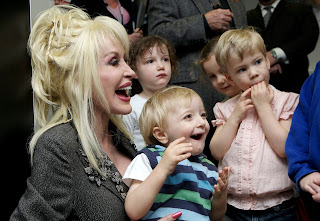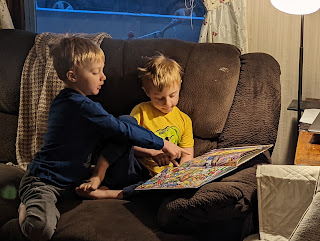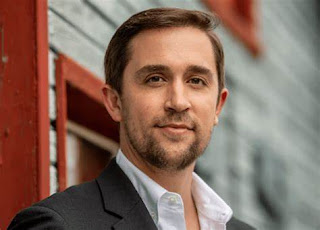I may regret this, but I'm going to watch a recent Betsy DeVos interview so that you don't have to.
Michael Knowles studied acting, got a degree in history and Italian from Yale, and at college reconverted to Catholicism. After graduation he dabbled in acting, and in 2016 was invited to join the Daily Wire, the far right media shop run by fellow frustrated media star Ben Shapiro. Knowles fits right; he won some notoriety for calling climate activist Greta Thunberg a "mentally ill Swedish child." During the first impeachment of Donald Trump, he joined in a project with Ted Cruz to defend Dear Leader. There's lots more, but you get the idea. He has a show, and he put Betsy DeVos on it.
Here's a link, which I include not because I think you should go watch it, but to keep me honest.
Here we go. Title of the video-- "The Progressive Attack on Your Children."
We open with some classy Brandenburg Concerto (No. 2), while Knowles and DeVos take a selfie (cause, you know, the youngs dig that stuff). In the back of the spare set (two chairs, tiny table with a couple of coffee cups, some paper, and a book)some guy holds a clapboard, a really unnecessary item for a modern video, but okay. The pair mime some pre-interview chat.
MK: At the center of every contentious issue has been education, and for 35 years, at the center of education has been Betsy DeVos--who has a new book (waves book).
BD: That wide smirk that doesn't get to her eyes.
MK: While showing some pictures of DeVos with children in what we'll assume is some private school, Knowles backgrounds us by saying that education has flown under the radar and not been a top tier issue until about a year ago. Which is news to lots of us, but in the sense that politicians haven't paid much attention, sure. His real point is that politicians can now score points by hammering on education, starting with Patient Zero of this idea, Glen Youngkin. He throws in Florida, too, though Florida's efforts to dismantle public education go back years and years. So I guess we've established that this is a subject on which Knowles' knowledge is neither broad nor deep. Perfect.
MK: Is this the moment?
BD: It is the moment. (So far nobody has said for what). The last two years have "laid bare the failings of a 175 year old system" (says the woman who is devoted to a system of religion that is many centuries old). She wants you to know that she has seen those failings for many years, despite her lifelong lack of direct contact with the public education system.
The bare laideness has come via extended shutdowns and mandates and mask mandates "and you know in out whatever blended learning distance learning" says the woman who used to pitch computer-delivered learning hard. But it's worth noting that the list of complaints is a vague word salad that we could sum up as "a bunch of stuff we could use to piss people off" almost as if the actual issues matter less than the political opportunity they create. She says parents were really frustrated (she's going to skip right past the polls showing that parents were mostly happy with how their schools handled the pandemic).
Parents are riled up "and rightfully so" she says over photos from "CRT" protests. But that means it's an "ideal time to push forward with policy that will empower families." In other words, a political opportunity.
MK: What do you think specifically riled them up, he asks, giving her a chance to firm up that word salad batch of complaints she first mentioned. He also wonders if "transgenderism in the schools" because "boys going into a girls locker room" would be a "red line" for Knowles. Or is it "critical race theory"? Or was it "this bizarre experience of covid" where the schools are shut down and "the teachers unions keep the kids out for two years," a phrase that contains 0% actual facts,
BD: I think it's all of the above, she says, taking the softball she's offered. She repeats that in many ways, then shifts to the myth of many parents thinking they had a good school and finding out it's not, and the tale of them being told to shut up and sit down and it all makes me wonder--in what setting exactly has DeVos been chatting with public school parents. They'd never caught on or noticed this stuff before, but now with their attention drawn to it (by something, I guess, and not, say, by well-heeled conservative activism groups and media campaigns pushed by guys like Christopher Rufo).
She's going to bring up the tale of the FBI being sicced on parents to keep them from expressing concerns or asking questions (because yeas, that's totally the behavior that had some folks alarmed and not, say, threats of personal violence).
MK: Wants to make sure we connect the Biden administration to the FBI and the DOJ called parents, who just wanted to ask some questions and say cut the nonsense, pose a terrorist threat, and I could go look up the facts on this (yes, the FBI said a dumb thing, but not as dumb as the oft-misquoted thing, and no, parents weren't just chatting pleasantly at board meetings), but facts and nuance don't really matter here.
BD: DeVos kind of forgets for a second that she's supposed to keep up the appearance of a conversation here and just says "Yeah" and then gets in gear. It's "jaw-dropping to think that is how we're deploying the highest law enforcement agency" and to send the FBI into schools (which I don't think has happened). As always, I kind of love how bad she is at the general give and take of talking and interviewing and getting those talking points out there in a natural way.
She says this has awakened other parents (though they are presumably not actually woke). Now she'll get back to how the emphasis is on what's right for adults and not on what's right for kids.
MK: Yes, this is just "the exposure of the teacher unions." "You've known for a very long time--I've known for a very long time--that the teachers unions are positively villainous" His actual words. Delivered with a chuckle. "They have destroyed so much of American education." Also his actual words.
The average voter "who's not plugged into politics all the time, probably that wasn't abundantly clear." True. For instance, parents who were more focused on their children's education probably failed to notice how their children's villainous teachers were destroying education. Not "until covid."
BD: Exactly. And here's a new talking point from DeVos. She wants to talk about the "school unions" which "represent a whole lot more than teachers." So congrats bus drivers and lunch ladies and administrators, and welcome to the deep conspiracy to destroy education. Also, and it appears as sort of floating phrase, so I'm puzzled, but "teachers are sort of a second thought with the teachers union."
The school union kept schools closed way longer than necessary, and we keep hearing this narrative because they think it works, but it remains largely bullshit. Also in her alternate history, in the spring of 2020 everyone in the world was reopening schools, and "we" encouraged folks to make plans to get schools open in the fall, and maybe she means the USED under her, but mostly that USED spent 2020* saying "it's not our job to help you figure out what the heck to do about this" before it started saying "we've decided it's okay to use our power to coerce you into doing what we want." Neither was helpful.
She talks about how we won't know for a while how much harm was done by the closures and half closures and in and outs, and on this she is correct. It was a complicated time, exacerbated by federal refusal to offer guidance or useful information, and lots of fear all around. She says "they" weren't playing politics, but if you're going to reduce the whole complicated mess to "everyone wanted to open schools but the unions kept them closed" then playing politics is exactly what you're doing.
MK: He underlines the "scary point" that we won't know the effect. And he very artfully shifts to "we won't know the effects of what's going on right now" which shifts us back to "this moment in the schools" where the big threat is "the gender ideology" and there's that good old DeVos smirk. Did I mention I've missed that?
His claim is that in some schools, an 11 year old child could be put on puberty blockers without parental notification, to which I would ask, name one. He really hates transgender stuff. Irreversible changes without notifying parents. "How do schools get away with that?" and again I would ask, name one school that has, in fact, done that. At this point in this particular scare campaign, folks like Knowles ought to have found a poster child for this threat, and yet there doesn't seem to be one.
BD: To her credit, she answers "Well, I don't think they will." Because people have "awakened" and shining a light will force behavior changes on schools. Or maybe it was never going to happen in the first place.
She shifts to the idea that post-covid, we will no longer assume that schools are teaching students what they need to know etc etc basically "we're hoping people stop trusting public schools now."
"We've known for a long time before covid that the system most kids are in has has not done well and has not helped kids achieve to the levels they need to." Now she'll toss out the old PISA score baloney. "We're not even in the top ten": she says, skipping the "and never have been ever" part. And here comes the old "we spend more and more money and get worse and worse" which is also bullshit (I recommend a stroll through sites like this for some of the basics).
MK: He imagine that she is going to be "highly sought after person looking ahead to 2024" which I think is true, but mostly because she'll still be filthy rich then. But he suggests it's because of her educational expertise. What would her advice to a 2024 candidate be? Which is an interesting question if one imagines the candidate is Trump, from whom she bolted quickly on January 7, 2021.
BD: Can you guess. She will tell the candidate to focus on universal education freedom for every family in America aka that voucher program she tried unsuccessfully to sell for her last few years in DC. Also, "fundamentally changing the system we've lived with for 175 years." Choice would free students who wanted it and could use the help (unless of course they were not Christian or were expensive to educate or LGBTQ or any of the other things that voucher schools reserve the right to discriminate against).
MK: Could a Republican or "a well-meaning Democrat, if we could find one in office" har enact a federal school choice policy?
BD: DeVos shows how DC affected her by saying the executive branch could enact a tax credit scholarship program, because federal overreach of the executive branch is only bad when the Other Guy uses it to push Common Core and not when Our Guy uses it to create federal school vouchers. It doesn't create another federal program she lies, it just gives the treasury department another revenue stream to manage and require some agency to handle the scholarship granting organization and maybe not much more if you accept the idea that millions of taxpayer dollars should be thrown around without6 any oversight or accountability.
MK: That's a great idea, he says as if he's being surprised at hearing about an idea that she tried desperately to sell and couldn't get off the ground when the GOP was in power. "I absolutely love that idea," he says and now I'm wondering whether he's an incredible suck up or just did zero homework for this interview.
BD: Yes!
MK: Even conservatives who don't want to grow the government should love it because you're just moving money from one place to another, and that, I guess, can be done by magical elves riding unicorns. Oh and one place is a place "where it's probably being wasted" as if blowing a $5 billion hole in the budget is no big deal.
Education is not a side issue, says the guy who thinks education policy only got on the radar two years ago.
BD: We have not "had the kind of creativity or disruption in the education industry that we've had in every other sector of our society." And I assume she doesn't mean "getting scrambled by a pandemic" disruption but instead refers to "some entrepreneurs get to make money" disruption. She is sure that when we get that, we'll be amazed at the ingenuity and innovation that will ultimately help children and this is a good time to remember that this is woman who knows very little about how public education actually works. Also, children are frustrated and bored to death, says the woman who has barely set foot in any place where actual students might be found.
MK: I've got a 17 month old baby and another on the way, so I'd like to get this fixed right now because I'm having trouble finding a good school around Nashville, where "they say even the good schools have gone pretty woke" so what am I going to do with my kid, says a guy whose personal wealth already gives him the kind of choice that she says she wants everyone to have, suggesting that maybe market forces don't automatically provide all the choices you want just because you want them. Do I "homeschool my kid and miss out on my tax credit," says the guy who's totally focusing on the child's concerns and not the concerns of an adult.
BD: Well, here's a new one. She suggests that if Tennessee adopts statewide education savings accounts (aka super-vouchers) you could take that sum and pool it with others to form a homeschool consortium, and pay a really great teacher to come teach your kids. Which is another version of the DeVos dream--to drop out of society at large into your own well-funded exclusive private bubble.
This will be great for teachers, because they will be the highly valued part of the privatized system (which the wealthiest members of society will be able to grab the exclusive rights to) and they'll be able to find their own niche and their own place to teach in ways that really work for them (unless that way is in a public school). It's really an exciting prospect for teachers as well, she says. To work as at will employees with no job protections or pensions or chance to advance financially or professionally, she doesn't say.
MK: Oh my God. I have to quote all of this.
"This sounds like when Western civilization made sense, when our civilization was growing and thriving--this is how education was done. It wasn't big institutionalized one-size-fits-all public schools. Alexander the Great (going all the way back) Alexander the Great didn't go to a public school...he was tutored by Aristotle."
Sure. And his servants and slaves were tutored by nobody. And nobody else got the education that Alexander did. And there was one Aristotle only. Exactly how does anyone imagine this could be a model for education today, other than the suggestion that we just don't need public education because only Certain People are entitled to a really good education (can you gue$$ how we can identify them). But he's ahead of me.
This was available to people who had privilege and means-- why can't we give that to everybody?
BD: We can. With vouchers.
No, we can't. There is no voucher big enough in the world to keep folks like the DeVos family from hoarding all the Aristotle's for themselves. Most vouchers barely cover the cost of a mediocre private school or a super-crappy microschool (which looks much like the distance learning that she so dislikes).
She wants to elaborate that by giving the money designated for that child's education, we'll get Big Enough vouchers. I suggest we should also give everyone their cut of government spending for transportation to arrange their own roads. Also, give them their cut of military and law enforcement spending and let them get their own protection and fight their own wars.
Shout out to Jean Allen, as DeVos "metaphorically" attaches the money to that child's backpack (or even, maybe, in the backpack). But that backpack would get us to home school, one room school house, or microschools (okay, here's more about this bad idea)--all the sort of thing that rich folks will never choose for themselves but which they will happily let the poors get stuck with. No accountability or oversight--just "here's a voucher--your kid's education is no longer my problem. Good luck and goodbye!"
She claims that there have been a lot of interesting educational entrepreneurial experiments in this country. Some are in her book, but they need tax dollar support (carried in backpacks by "empowered" families) to take them to scale. Maybe he'll have that chance. Or maybe he'll be wealthy enough not to care.
MK: There are many legitimate questions to be asked at this point. Knowles goes with "I'm in. I want to sign up." He thinks most Americans will be too, because the parents movement appeals to GOP and Dems, white and Black folks-- a "very very wide appeal"
However--duhn duhn duhnnnnnn-- there are "entrenched interests." The school unions "as you aptly call them," the government bureaucrats, and the leftist activists who have "infiltrated these schools" and "used the schools to advance their ideology" are "not going to like that," so how do you overcome these hurdles to school choice?
BD: You elect people at all levels "who support this notion of education freedom," hold them accountable in office, and defeat the ones who are opposed to it. That's the old DeVos playbook, sort of, only instead of "elect" she used "finance the election of."
MK: Oh, this is novel. What he likes about her approach--there are many people on the right who have a little too much in free markets or the culture and don't focus on direct political action, and now I'm thinking of P. J. O'Rourke's definition of politics as the business of getting power and privilege without possessing merit. He likes the way she has worked on and in the GOP, which others might describe as putting alignment to her personal goals over allegiance to the party.
Anyway, for the regular old republican or activist listening, what do they do practically?
BD: Vote for the right people. As she's saying this, photos of Blake Masters, Brian Kemp, and Katie Britt. Quiz them on whether they support education freedom or not, and what they mean by that term that mostly only DeVos uses. Get them on record. Hold them accountable. It feels like maybe these are easier to do if you're really rich.
MK: Which states are doing this better?
BD: Florida is the most advanced. For more than twenty years starting with policies that Jeb Bush put into place.
MK: Smiling. I seem to recall you had a hand in some of those policies.
BD: Yes. we've been working in Florida for a long time. Legislators and governors have built on that.
Arizona has been very good. Indiana has been great. Wisconsin and Ohio have continued to expand. Tennessee has come along. 26 states have some form of "education freedom."
MK: You have a great deal of humility about what you've accomplished in politics. You've been chipping away at this issue, he says, as we see clips of long-ago Betsy (at least one seems clearly from the 80s if I'm any judge of hair). He says that many perceive her as "the devil incarnate" because they tuned in to CNN during the Trump administration. That from the man who called teachers unions positively villainous.
BD: That's absolutely right. If they'd like a different perspective and hope for what can be accomplished in a short time, read the book. She explains the title (Hostages No More) as a reference to a Horace Mann in a way that leads me to suspect that he is not a hero in the book. "We have got to free our children and families from being hostage to that cause," as in public education. Schools run counter to families values and aspirations for their children.
MK: Hasn't read the book yet (it isn't out and he just got his copy). He wants to point out that while people may think our public education problems go back a few decades, but they go back to the very beginning of public education. So, "Public education--always wrong and bad" is, I guess, the slogan here.
BD: Yes, indeed. "And when our modern (she puts modern in scare quotes) education system was implemented, it was specifically to educate and form children to become factory workers and uh in you know industrial age just to go do the same kind of job day after day time after time (there are some child labor photos on screen) and again our society has fundamentally changed and yet we're still practicing the same approach to how kids learn."
Two things--please consult an act education historian like Adam Laats or Diane Ravitch because this education origin story is baloney
Second, I don't think I've ever seen before how much more relaxed and natural DeVos is when she's discussing the stuff she knows--politics, state situations on educational politics, political angling--compared to how awkward and even tongue-tied she gets when discussing other things, like anything having to do with actual schooling.
MK: We just see kids "being turned out as automatons" and I'm thinking "Dude, you graduated from a public high school 14 years ago." We describe that as a bug but in fact--
BD: --it was a design
MK: So we need a different system.
BD: Exactly. Though it's worth noting, we have not described what that system would look like, other than it would look like a bunch of entrepreneurs innovating and being paid with taxpayer dollars. But DeVos, who remains fundamentally ignorant of how schools actually work, has never, ever gotten into the actual details of instruction and content that determine exactly what a school in turning out.
MK: Get her book. Arm yourself.
*Originally in my haste to live-blog this I got my 2020 and 2021 scrambled. All fixed now.








